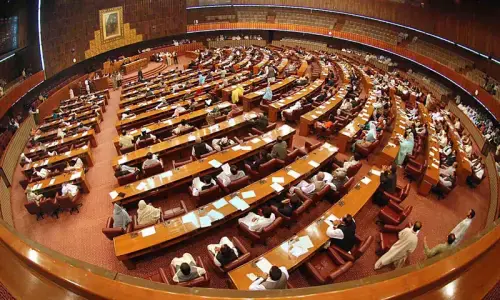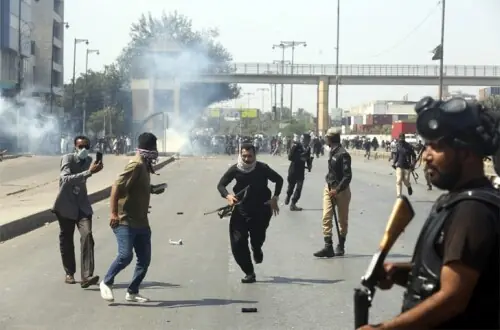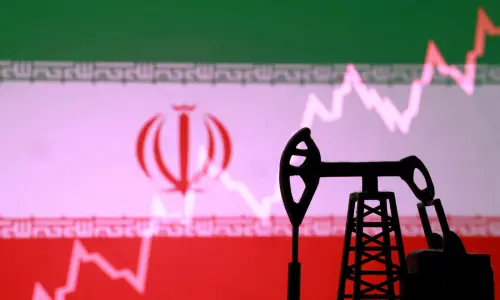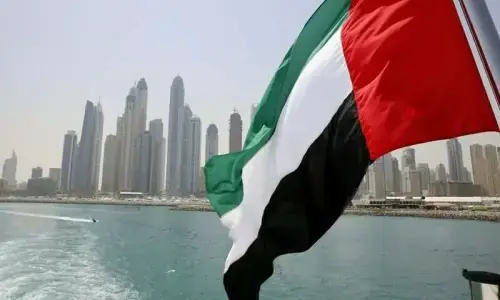ISLAMABAD: The government said on Thursday it had assured Saudi Arabia of its support in enforcing the United Nations Security Council’s arms embargo on Houthi militia and forces loyal to former Yemeni president Ali Abdullah Saleh, which could entail a role for the Pakistan Navy.
The commitment was conveyed to the Saudi leadership by Punjab Chief Minister Shahbaz Sharif who visited the kingdom on Wednesday as special envoy of the prime minister, along with Adviser on Foreign Affairs and National Security Sartaj Aziz, Chief of General Staff Lt Gen Ashfaq Nadeem and Foreign Secretary Aizaz Chaudhry.
Briefing a specially convened meeting at the Prime Minister’s House on the trip, the delegation members said: “They affirmed to the Saudi leadership that the government of Pakistan would fully participate and contribute to the implementation of the UNSC resolution.”
Read: Iran will submit peace plan for Yemen to UN
A statement issued by the Prime Minister’s Office did not explain how Pakistan planned to help Saudi Arabia in enforcing the arms embargo.
Speaking to Dawn on the background, a key government figure said a separate announcement would be made by the government about committing its naval vessels for the purpose.
UNSC resolution provides Islamabad an opportunity to contribute to action against Yemeni rebels
“We are looking at how many ships can be spared,” he said, adding that two Pakistan Navy vessels were already in the region conducting anti-piracy operations as part of the Combined Task Force 151.
Also read: Neutral but not really
Earlier in the day, Prime Minister Nawaz Sharif held a separate meeting with Chief of Naval Staff Admiral Mohammad Zakaullah for discussing the modalities of participating in the force which would monitor and enforce the UN-mandated arms embargo.
The government has moved in a ‘gradual manner’ to involve itself in Yemen, the government functionary said, adding that it was “done to sustain the positive narrative”.
The government said its decision to contribute to enforcement of the embargo was “pursuant to paragraphs 10 and 11 of parliament’s resolution of 10th April”.
The paragraphs had called for supporting Saudi Arabia in case of violation of its territorial integrity and threat to two Holy Mosques and expanding cooperation with Gulf Cooperation Council and other regional countries against extremism and terrorism, which are said to be threatening security and stability of the region.
Also read: Parliament insists on neutrality
Saudi Arabia had been pressurising Pakistan to provide troops, warplanes and navy ships for the offensive against Yemeni Houthi rebels who had overthrown the government of President Abd-Rabbu Mansour Hadi. But Pakistan has so far been reluctant to make such a commitment.
The parliamentary resolution emphasising on neutrality in the conflict made the government’s task further difficult and also annoyed Arab leaders.
The UNSC resolution calling for arms embargo provided Pakistan an opportunity to contribute to the action against Houthis, though in a non-offensive role.
The PM Office statement said the delegation, besides assuring assistance in enforcement of the embargo, also pledged to consider expanding cooperation with Saudi Arabia under the UN resolution.
Another noticeable development in Pakistan’s position is that for the first time the country “expressed its concerns over the reports of foreign support to the Houthis” – in a clear reference to the alleged Iranian involvement with the Yemeni militia.
The Foreign Office has so far been saying that it did not subscribe to the allegations that Iran was backing the rebels.
In an angry reaction to the parliamentary resolution, UAE Minister of State for Foreign Affairs Anwar Gargash had said: “Tehran seems to be more important to Islamabad … than the Gulf countries.”
Islamabad has been very particular in dispelling the impression about its closeness with Tehran.
The participants of the meeting expressed the hope that “all Yemeni parties would resolve their differences through dialogue and consultation, and all parties would take steps to agree and implement a consensus-based political solution to Yemen’s crisis in accordance with Gulf Cooperation Council (GCC) initiative and its Implementation Mechanism and the outcomes of comprehensive National Dialogue conference.”
The meeting presided over by Prime Minister Sharif was attended by Sartaj Aziz, Shahbaz Sharif, PM’s Special Assistant Tariq Fatemi, Chairman Joint Chiefs of Staff Committee Gen Rashad Mahmood, Chief of the Army Staff Gen Raheel Sharif; Chief of Air Staff Air Chief Marshal Sohail Aman, Chief of Naval Staff Admiral Mohammad Zakaullah, Chief of General Staff Lt Gen Ashfaq Nadeem Ahmad, Foreign Secretary Aizaz Ahmed Chaudhry and other senior officials.
Published in Dawn, April 17th, 2015
On a mobile phone? Get the Dawn Mobile App: Apple Store | Google Play
































